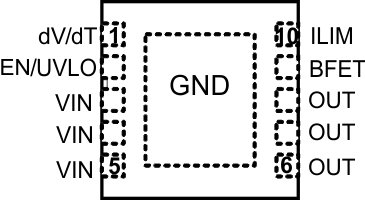ZHCSE39A August 2015 – August 2015
PRODUCTION DATA.
- 1 特性
- 2 应用
- 3 说明
- 4 修订历史记录
- 5 Device Comparison Table
- 6 Pin Configuration and Functions
- 7 Specifications
- 8 Detailed Description
-
9 Application and Implementation
- 9.1 Application Information
- 9.2
Typical Applications
- 9.2.1
Simple 3.7-A eFuse Protection for Set Top Boxes
- 9.2.1.1 Design Requirements
- 9.2.1.2 Detailed Design Procedure
- 9.2.1.3 Application Curves
- 9.2.2 Inrush and Reverse Current Protection for Hold-Up Capacitor Application (for example, SSD)
- 9.2.1
Simple 3.7-A eFuse Protection for Set Top Boxes
- 10Power Supply Recommendations
- 11Layout
- 12器件和文档支持
- 13机械、封装和可订购信息
6 Pin Configuration and Functions
DRC Package
10-Pin VSON
Top View

Pin Functions
| PIN | DESCRIPTION | |
|---|---|---|
| NAME | NUMBER | |
| BFET | 9 | Connect this pin to the gate of a blocking NFET. See the Feature Description section. Leave this pin floating if it is not used. |
| dV/dT | 1 | Tie a capacitor from this pin to GND to control the ramp rate of OUT at device turn-on. |
| EN/UVLO | 2 | This is a dual function control pin. When used as an ENABLE pin and pulled down, it shuts off the internal pass MOSFET and pulls BFET to GND. When pulled high, it enables the device and BFET. As an UVLO pin, it can be used to program different UVLO trip point via external resistor divider. |
| GND | Thermal Pad | GND |
| ILIM | 10 | A resistor from this pin to GND will set the overload and short circuit limit. |
| OUT | 6-8 | Output of the device |
| VIN | 3-5 | Input supply voltage |